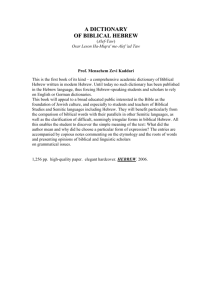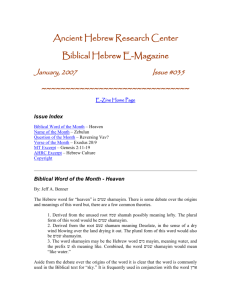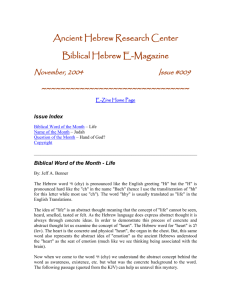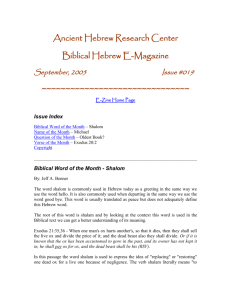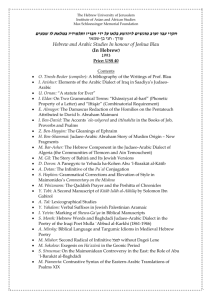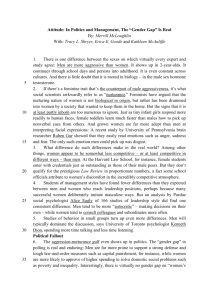Biblical Hebrew E
advertisement
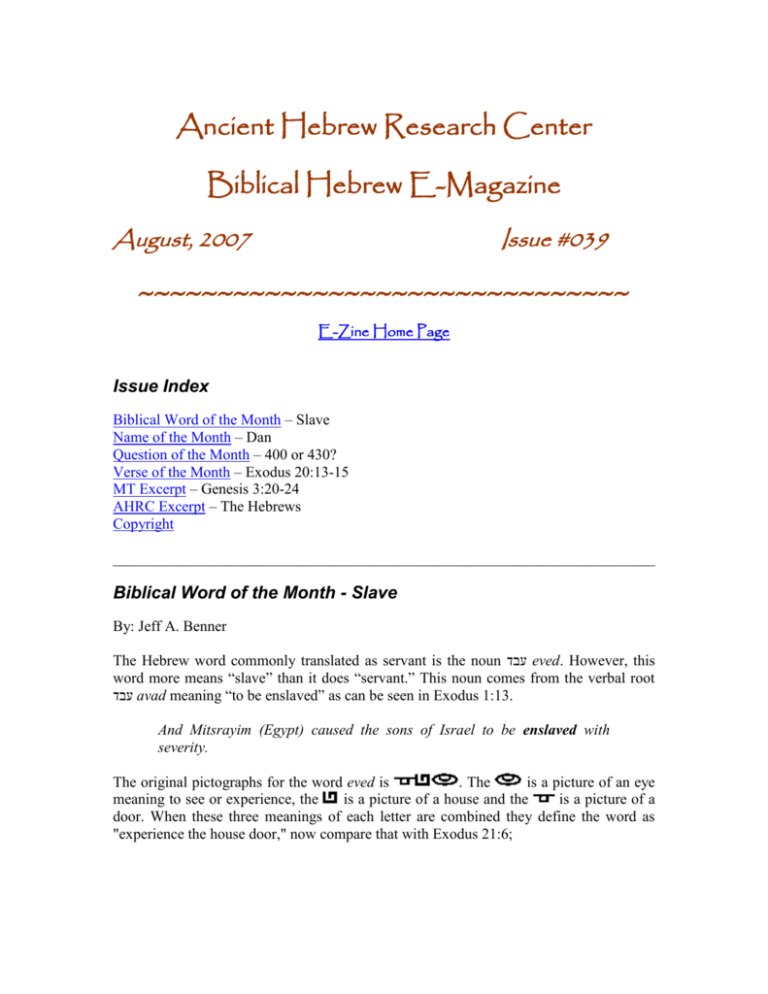
Ancient Hebrew Research Center Biblical Hebrew E-Magazine August, 2007 Issue #039 ~~~~~~~~~~~~~~~~~~~~~~~~~~~~~~~ E-Zine Home Page Issue Index Biblical Word of the Month – Slave Name of the Month – Dan Question of the Month – 400 or 430? Verse of the Month – Exodus 20:13-15 MT Excerpt – Genesis 3:20-24 AHRC Excerpt – The Hebrews Copyright ________________________________________________________________________ Biblical Word of the Month - Slave By: Jeff A. Benner The Hebrew word commonly translated as servant is the noun עבדeved. However, this word more means “slave” than it does “servant.” This noun comes from the verbal root עבדavad meaning “to be enslaved” as can be seen in Exodus 1:13. And Mitsrayim (Egypt) caused the sons of Israel to be enslaved with severity. The original pictographs for the word eved is . The is a picture of an eye meaning to see or experience, the is a picture of a house and the is a picture of a door. When these three meanings of each letter are combined they define the word as "experience the house door," now compare that with Exodus 21:6; Biblical Hebrew E-Magazine Then his master shall bring him to God, and he shall bring him to the door or the doorpost; and his master shall bore his ear through with an awl; and he shall serve him for life. ________________________________________________________________________ Name of the Month - Dan By: Jeff A. Benner The next son of Jacob in our series is Judah. This name was presented in Issue #9. The next son after Judah is Dan. And Rachel said, God hath judged me, and hath also heard my voice, and hath given me a son: therefore called she his name Dan. Genesis 29:34 (KJV) The Hebrew verb דיןDeen [H:1777] means “to judge” such as we can see in the verse above. This is the root of the name דןdan [H:1835], meaning a “judge,” and is also found in the verse above. In Jacob’s final words to Dan he also makes the connection between these two words. Dan shall judge (deen) his people, as one of the tribes of Israel. Genesis 49:16 (KJV) _______________________________________________________________________ Question of the Month – 400 or 430? By: Jeff A. Benner Q: Why are the years of Israel’s sojourning different in Genesis 15:13 and Exodus 12:40? A: The Hebrew text of Genesis 15:13 says "arba (4) me'ot (hundred) shanah (year)" - 400 years and Exodus 12:40 says "sheloshiym (30) shanah (year) v’arba (and 4) meot (hundred) shanah (year)" - 430 years. It is likely that at some point a scribe was copying the text of Genesis 15:13 and accidentally skipped over the words "sheloshiym shanah v” (30 years and). This is not uncommon. There are many mistakes in the Hebrew Bible where words, phrases even sentences are accidentally deleted or even duplicated. The 430 years is also confirmed in Galatians 3:17. If the original number was 430 years, does this mean that Israel was in the land of Egypt for 430 years? This would not coincide with the genealogy provided in the Biblical text which indicates Israel was in Egypt for approximately 200 years (the only variable being the age of Kohath when he bore Amram and the age of Amram when he bore Moses). 2 Biblical Hebrew E-Magazine However, if we assume an age of 61 years for Kohath when he bore Amram and an age of 62 years for Amram when he bore Moses (this may sound like an old age but Abraham was 87 when he bore Ishmael, Isaac was 60 when he bore Jacob and Jacob was 87 when he bore Levi), then there would be 430 years from the birth of Isaac to when Israel entered the Promised Land. Genesis 15:13 does not say Israel would be in Egypt for 430 years (though this is how most interpret this passage) but that Abraham’s descendents (possibly meaning with the birth of Isaac) would sojourn in a land that did not belong to them. ________________________________________________________________________ Verse of the Month – Exodus 20:13-15 By: Jeff A. Benner ל ֹא ִּת ְרצָ ח׃ ל ֹא ִּתנ ְָאף׃ ל ֹא ִּתגְ נֹב׃ Thou shalt not kill. Thou shalt not commit adultery. Thou shalt not steal. (ASV) ( ל ֹאlo) This word negates the following verb. ( ִּת ְרצָ חtir-tsahh) The base word is the verb ( צרחtsarahh) meaning “to kill,” or more correctly, “to murder.” The prefix תidentifies the verb tense as imperfect - will murder - and the subject of the verb as second person, masculine, singular - you will murder. Because of the preceding word this would be translated as “you will not murder.” ( ל ֹאlo) This word negates the following verb. ( ִּתנ ְָאףtin-aph) The base word is the verb ( נאףna’aph) meaning “to commit adulter.” The prefix ת identifies the verb tense as imperfect - will commit adultery - and the subject of the verb as second person, masculine, singular - you will commit adultery. Because of the preceding word this would be translated as “you will not commit adultery.” ( ל ֹאlo) This word negates the following verb. ( ִּתגְ נֹבtig-nov) The base word is the verb ( גנבganav) meaning “to steal.” The prefix תidentifies the verb tense as imperfect - will steal - and the subject of the verb as second person, masculine, 3 Biblical Hebrew E-Magazine singular - you will steal. Because of the preceding word this would be translated as “you will not steal.” The following is a literal rendering of this verse from its Hebraic meaning. You will not murder, You will not commit adultery, You will not steal. In following issues we will continue with this chapter. ________________________________________________________________________ Mechanical Translation Excerpt - Genesis 3:20-24 20 and the human called out the title of his woman “Hhawah [Living]” given that she existed a mother of all of the life, 21 and “YHWH [He exists]” of “Elohiym [Powers]” made for the man and for his woman tunics of skin and he clothed them, 22 and “YHWH [He exists]” of “Elohiym [Powers]” said, though the human had existed like a unit from us to discern function and dysfunction and now otherwise he will send his hand and he will take also from the tree of the life and he will eat and he will live to a distant time, 23 and “YHWH [He exists]” of “Elohiym [Powers]” sent him from the garden of “Eden [Pleasure]” to serve the ground which from there he was taken, 24 and he cast out the human, and the “Keruv [Sword]” and a blazing one dwelt from the east to the garden of “Eden [Pleasure]”, the sword overturning herself to guard the road of the tree of the life, For details on this new translation see the web site at http://www.mechanical-translation.org _______________________________________________________________________ AHRC Website Excerpt – The Hebrews The first person mentioned in the Bible as a "Hebrew" is Abraham. "One who had escaped came and reported this to Abram the Hebrew" (Genesis 14:13). Is Abraham the first Hebrew? The Hebrew word for a "Hebrew" person is ( עבריeevriy) and comes from the root word ( עברever) which means "to cross over." A Hebrew is "one who has crossed over." The name of one of Abraham's ancestors was ( עברever - Genesis 11:16, written as Eber in English translations). This name also comes from the same root word making it highly possible that Eber is the father (progenitor) of the eevriy (Hebrew) people. 4 Biblical Hebrew E-Magazine The Bible is the story of God and his covenant relationship (Hebraicly understood as crossing over from death to life) with an ancestral line beginning with Adam through his descendants Noah, Abraham, Isaac, Jacob and Jacob's descendants who became the "nation of Israel" also known as "the Hebrews." It is possible that a Hebrew was one who had "crossed over" into a covenant relationship with God, which would have begun with Adam. When I refer to the "Ancient Hebrews" I am referring to this ancestral line from Adam to the Nation of Israel. This article is located on the web site at http://www.ancient-hebrew.org/11_who.html ________________________________________________________________________ Copyright © 2007 Jeff A. Benner Ancient Hebrew Research Center Please feel free to use, copy or distribute any material within the "Biblical Hebrew E-Magazine" for nonprofit educational purposes only. ________________________________________________________________________ 5

